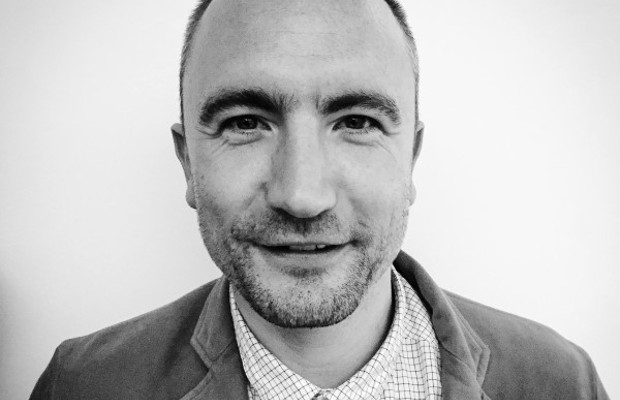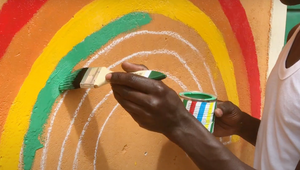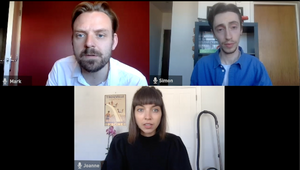
5 Minutes with… Joe Wade

Don’t Panic is a creative agency that gets to have its cake and eat it. That’s probably an organic, fair trade cake, as the majority of the agency’s work is focused on helping brands and non-profit clients make a positive change in the world. Whether that’s encouraging people to buy plots of Sumatran rainforest to save it’s inhabitant Orangutans, applying pressure to change UK environment protection laws by creating an attention-grabbing movie trailer for a dystopian Wind in the Willows, or advertising purposeful dairy products. As a team they get to make great work for their clients, but they also get to feel good about themselves.
LBB’s Alex Reeves sat down with Joe to discuss how creativity can be put to work for the greater good.
LBB> Where did Don’t Panic start for you?
Joe> The name Don’t Panic is from The Hitchhiker’s Guide to the Galaxy. We started out doing club promotions; that’s when we started to do the Don’t Panic packs. There were lots of flyers for fun things, gaming stuff, jelly beans, condoms; so we decided to use the packs to talk to young people about social issues and causes (I guess I’m a bit of a fun sponge like that) so we launched the Don’t Panic Poster. To prevent this becoming too worthy the artwork was done with, say, Banksy or Shepard Fairey or another well-known artist at the time. Banksy would come in and we’d work on poster about social issues, causes and campaigns like Stop Esso with Greenpeace.
LBB> What were the first big steps on the journey towards where you are now?
Joe> A step forward would be in 2008 or 2009 when Heydon Prowse and I started to make videos in response to the banking bailout and the MPs’ expenses scandal, with the thought that it would be good if a wider audience knew more about it. I would be reading the Guardian or Private Eye or the Financial Times and realised we needed to take that information, simplify it and make it more organically shareable. We had no money, but we wanted to get a lot of young people thinking about current affairs and doing things about these issues, so we used YouTube, and consequently, often ended up making stunt videos.
LBB> At this point did you think of yourselves as a creative agency?
Joe> Our aim was always to make content that did three things: 1) it would simplify a complex issue 2) it would have organic reach as we had no media budget 3) it would generate press. The first time we realised we were an agency was when we started using these techniques for commercial clients, the first being The English National Opera. The average age of an opera goer was 66 and they needed to attract a younger audience so we created ‘Can I Be Your Friend’ for the ENO first digital themed opera. The premise was “have you ever thought how odd your online life is?”. Jolyon Rubinstein went around London asking if he could follow people, ‘poke’ them, or if they wanted to look at his photos. Charlie Brooker tweeted it, viral success ensued and they opera was sold out. That’s when we realised we had a business to make ads people wanted to watch and share. As well as selling out the tickets the film won Best Viral Video at The Lovie Awards.
LBB> How does your unique evolution inform your thinking today?
Joe> A lot of what we do is “preaching to the unconverted” - we want to get across issues to new audiences. We’ve done it for charities, for ourselves and now we’re doing it for brands.
We feel that our experience enables us to bring brands’ purposes to life in a way which doesn’t make you cringe. It’s an easy thing to get wrong and there are the famous examples of it backfiring. However, there's an opportunity where most start-up or challenger brands are making purpose part of their business objectives, as opposed to trying to just tag something on.
You can argue that it’s not the job of an agency to give a brand purpose, that it’ll only be cosmetic, but a new agency model would bring in sustainability consultants and do more of a root and branch approach to help companies change the way they operate.
LBB> At what point did you realise you were ‘in advertising’?
Joe> I’m interested in advertising but we don’t sit around talking about how we love ads. I think being an ad agency isn’t what we want to be. We call ourselves a creative agency. We’re trying to look at things in a broader way. Working on a more human basis.
LBB> Your ‘Concrete Jungle’ work for the Sumatran Orangutan Society won this year's Best Fundraising Campaign Award at the Campaign For Good Awards. Can you talk about that?
Joe> The gratifying thing about that is it’s a huge ROI for a small charity. This was a great example of using an inspiring video at the heart of a campaign to land a big result. We did all the media and retargeting and raised £870,000 from one video, which enabled land in Sumatra to be secured as a safe haven for Orangutans.
LBB> So you’ve added a lot of strategy in since you started out, to make sure you can make a difference?
Joe> We’ve tried to take calculated risks to enable the work we do, we do well. Our methodology requires risky creative thinking, underpinned by strategy that means it’s a calculated risk. I think unless you’re willing to do something somewhat risky you won’t stand out; I think that’s probably worth it.
One of our other straplines is “creativity put to work”. We invented Engagement Strategy to ensure we aren't just creative for the sake of it. Our Engagement Strategists work end to end, working out how to re-contextualise an issue to make it relevant to a target audience. The emphasis of what we do is definitely still on earned and how to use the minimal amount of paid to get the biggest reach, which will still deliver on results. This is then complimented with paid strategies to ensure that audiences are kept within a user journey, funnelling them through to take a tangible action.
We’re also always looking for new ways to be effective. We did meet Cambridge Analytica a few times [before the huge scandal blew up in 2018]. I was like “we know you do all this evil shit for Trump and stuff. Can you do it in a legal way for our good clients, for a change?” They were sort of interested and basically it was mostly bullshit. They had all that data but in America there are fewer laws protecting how that data is used; over here they weren’t the potent force you’d have thought. I suspect their involvement [in the Brexit referendum] has been overstated. What they were offering was quite standard.
LBB> Outside of being a ‘fun sponge’, what do you like doing?
Joe> I still like trying out comedy writing on the side; writing for fun, developing comedy ideas is something I enjoy. We still work lots with Jolyon and Heydon.
In my spare time I struggle to maintain any kind of relevance. I like living in Peckham. There are lots of young people doing things; you can go out like an old vampire and feed off their energy. I think it’s all over when you move to the countryside, to a certain degree. I think house prices are forcing this on more people, but if you live outside of London, it's difficult to be relevant. I think you’ve also got to use public transport. If you don’t, you become cloistered. That’s where the real action is.
Something I should carve out more time for is reading, focusing on scientific developments. These days podcasts can help with that. I think you need as much knowledge as possible to come up with any original thinking.










